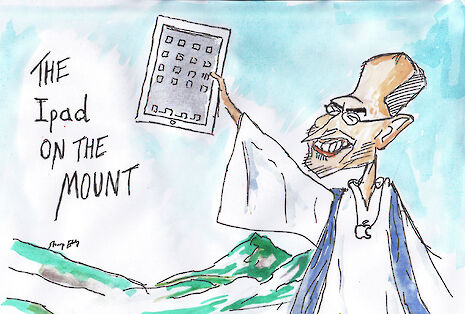iCult: The deification of Steve
The death of Steve Jobs has served to highlight the horrifying state of consumer society rites

Last Wednesday evening, news slowly leaked out over the internet, through Twitter, Facebook, and a host of other media tools, that a man had died.
Within hours, the death of this man had become a global event. The President of the United States of America made a statement. Technology stocks fell. Images were beamed worldwide of wreaths laid at this man’s office. Within hours, millions of blogs, articles and tweets had been written and published; bewailing the death of this man, discussing his greatness, uniting in the opinion that he had truly changed the world.
Within hours, Steve Jobs had become a saint.
This transubstantiation of a man into a deity is a shocking exemplar of the state of modern consumer society. For, at the crunch, Steve Jobs sold stuff. He didn’t give it away, he sold it. For a lot of money, at outrageous mark-ups. Pretty stuff, beautiful, simple, elegant stuff, yes. But stuff nonetheless.
After his death, the reactions of many were nigh-on religious. iStores were swamped with well-wishers laying flowers and bringing gifts for iStore employees. Many were in tears. Gary Hamel, a business professor, epitomised the reaction in the Financial Times: “I came out to this Apple store to pay my respects,” he said, clutching the power cord he had just bought inside. Clutching. A grim spectre of a modern-day disciple leaving his Consumerist temple.
“Why Steve?” asked so many, plaintively. Several commentators suggested, in what can only be looked upon with disgust, that they’d have been far less sad if Bill Gates had died. Take a moment to record Bill Gates’s achievements: this is a man who literally brought computing to the world.
Without Microsoft, without the PC, the world would be a fundamentally different place, far more so than if we lacked the iPod or the Macbook. This is of course not to mention the $28bn Gates has thus far given to charity in an effort to, amongst other things, eradicate Malaria. Mr Jobs, we should perhaps be reminded, was notable for his lack of charitable giving.
This is not to say that Steve Jobs should not be mourned. He was an extraordinary businessman and should be recognised as such. Apple, under his leadership, was for a moment last year richer than the US Government, and it is now the world’s largest technology company.
Jobs had a complete, coherent vision of what Apple was producing, what it stood for, and how it was going to go about it. No wide availability, or budget models for poorer clients, but expense and with that, exclusivity. No shops as such, but ‘spaces’, where you could spend as long as you wanted checking your e-mail, playing games, or chatting.
Jobs’ success lay partially in his desire for control. He micromanaged incessantly: his name can be seen on dozens of patents for devices across the Apple range, and he allegedly personally specified the manner in which Apple products must be displayed outside of iStores. Try going to John Lewis and ask for their Macbook Air to be picked up. It’s glued down. As is every single Macbook Air for sale not in an iStore.
The vision of a control freak perhaps, but Jobs’ vision played a part in changing the way we interact with technology. Find out about his death on your iPhone? Broadcast your shock and sadness about it from the same device? It is perhaps unsurprising that we have deified he who hath provided these goods – for some, those gadgets define who and what they are.
Unfortunately, Mr Jobs has been sanctified not for his prodigious personal abilities, but what he represented. Pretty technology. Gadgetry is the religious iconography of our age. Mr Jobs loved his technology. We loved it too – his product announcement speeches were legendary. We saw in Steve a prophet, a man who could give us what we most desired.
What is therefore most sickening about the response to his death is the lack of personal sympathy. Often, thoughts for his bereaved family were a guilty afterthought. The real focus for mourners was, inevitably, stuff. No more pretty stuff. What will the next iPhone look like without Steve? Will it be as pretty, as simple, as elegant?
The deification of Mr Jobs is, in homage to his own mantra, a simple, elegant, unconscious misdirection of our love of stuff. We cannot admit to ourselves the level to which our obsession with stuff has grown, for it would mean admitting the worship of icons for their own sake. Instead, we have placed Steve Jobs on a pedestal. It was not the technology we love – perish the thought. It was Steve. We love Steve for he was our prophet. But we worship his God at our peril.
Felix Danczak tweets @felixdanczak, and blogs at: intelligentdebate.wordpress.com
 News / Cambridge study finds students learn better with notes than AI13 December 2025
News / Cambridge study finds students learn better with notes than AI13 December 2025 News / Cambridge Vet School gets lifeline year to stay accredited28 November 2025
News / Cambridge Vet School gets lifeline year to stay accredited28 November 2025 Science / Did your ex trip on King’s Parade? The science behind the ‘ick’12 December 2025
Science / Did your ex trip on King’s Parade? The science behind the ‘ick’12 December 2025 News / Uni Scout and Guide Club affirms trans inclusion 12 December 2025
News / Uni Scout and Guide Club affirms trans inclusion 12 December 2025 Arts / Modern Modernist Centenary: T. S. Eliot13 December 2025
Arts / Modern Modernist Centenary: T. S. Eliot13 December 2025










